Unit 5 Nelson Mandela精品教案 Listening_Speaking and Writing
- 格式:docx
- 大小:7.33 KB
- 文档页数:2
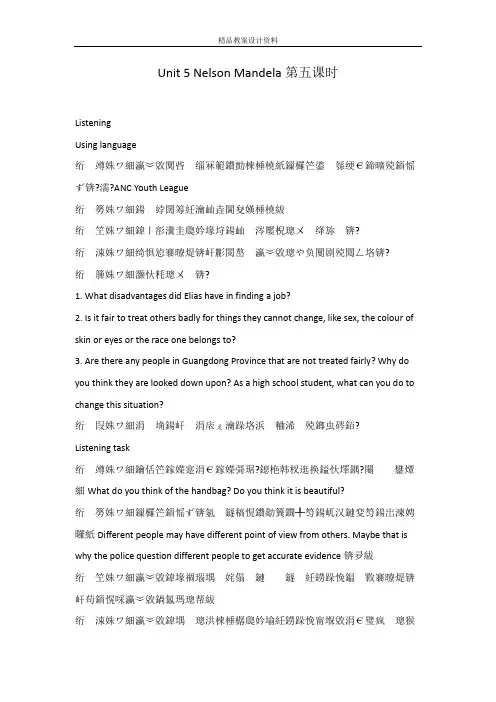
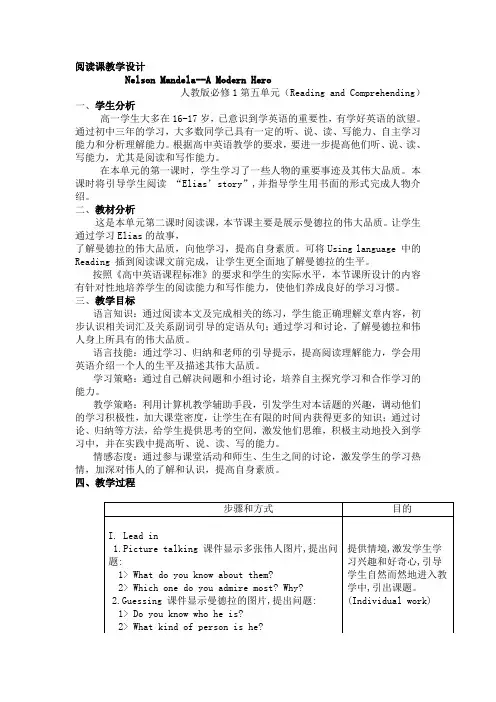
阅读课教学设计Nelson Mandela--A Modern Hero人教版必修1第五单元(Reading and Comprehending)一、学生分析高一学生大多在16-17岁,已意识到学英语的重要性,有学好英语的欲望。
通过初中三年的学习,大多数同学已具有一定的听、说、读、写能力、自主学习能力和分析理解能力。
根据高中英语教学的要求,要进一步提高他们听、说、读、写能力,尤其是阅读和写作能力。
在本单元的第一课时,学生学习了一些人物的重要事迹及其伟大品质。
本课时将引导学生阅读“Elias’story”,并指导学生用书面的形式完成人物介绍。
二、教材分析这是本单元第二课时阅读课,本节课主要是展示曼德拉的伟大品质。
让学生通过学习Elias的故事,了解曼德拉的伟大品质,向他学习,提高自身素质。
可将Using language 中的Reading 插到阅读课文前完成,让学生更全面地了解曼德拉的生平。
按照《高中英语课程标准》的要求和学生的实际水平,本节课所设计的内容有针对性地培养学生的阅读能力和写作能力,使他们养成良好的学习习惯。
三、教学目标语言知识:通过阅读本文及完成相关的练习,学生能正确理解文章内容,初步认识相关词汇及关系副词引导的定语从句;通过学习和讨论,了解曼德拉和伟人身上所具有的伟大品质。
语言技能:通过学习、归纳和老师的引导提示,提高阅读理解能力,学会用英语介绍一个人的生平及描述其伟大品质。
学习策略:通过自己解决问题和小组讨论,培养自主探究学习和合作学习的能力。
教学策略:利用计算机教学辅助手段,引发学生对本话题的兴趣,调动他们的学习积极性,加大课堂密度,让学生在有限的时间内获得更多的知识;通过讨论、归纳等方法,给学生提供思考的空间,激发他们思维,积极主动地投入到学习中,并在实践中提高听、说、读、写的能力。
情感态度:通过参与课堂活动和师生、生生之间的讨论,激发学生的学习热情,加深对伟人的了解和认识,提高自身素质。
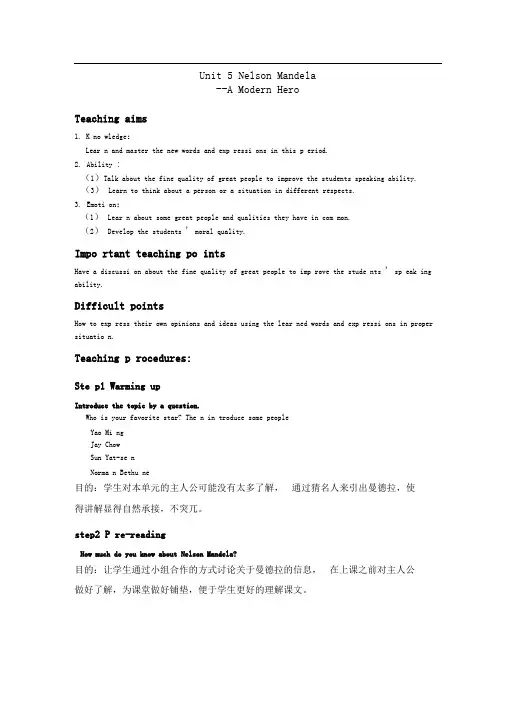
Unit 5 Nelson Mandela--A Modern HeroTeaching aims1.K no wledge:Lear n and master the new words and exp ressi ons in this p eriod.2.Ability :(1)Talk about the fine quality of great people to improve the students speaking ability. (3)Learn to think about a person or a situation in different respects.3.Emoti on:(1)Lear n about some great people and qualities they have in com mon.(2)Develop the students ' moral quality.Impo rtant teaching po intsHave a discussi on about the fine quality of great people to imp rove the stude nts ' sp eak ing ability.Difficult pointsHow to exp ress their own opinions and ideas using the lear ned words and exp ressi ons in proper situatio n.Teaching p rocedures:Ste p1 Warming upIntroduce the topic by a question.Who is your favorite star? The n in troduce some peopleYao Mi ngJay ChowSun Yat-se nNorma n Bethu ne目的:学生对本单元的主人公可能没有太多了解,通过猜名人来引出曼德拉,使得讲解显得自然承接,不突兀。
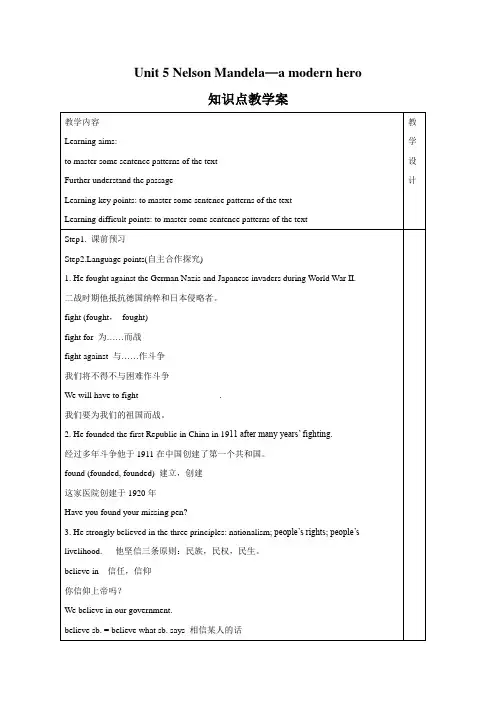
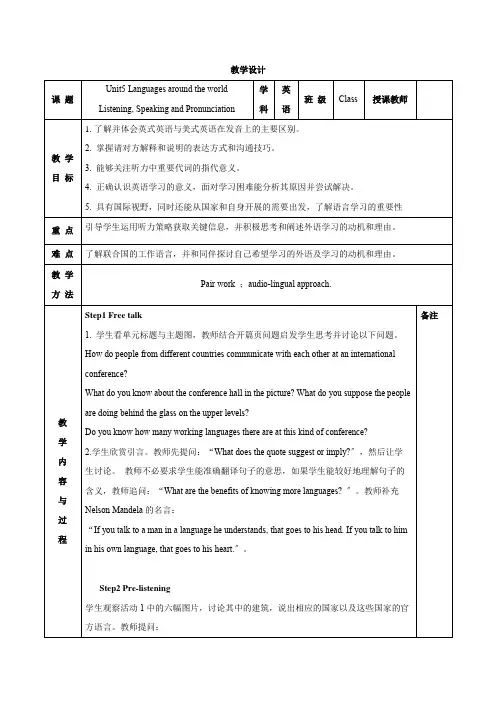
教学设计What countries do the pictures stand for? What official languages are spoken in these countries?教学提示:除了活动中提到的国家及相应的官方语言,教师补充,例如:China—Chinese、Japan—Japanese、Egypt—Arabic、Denmark—Danish、New Zealand—English and Maori、Brazil—Portuguese,补充的词汇可以包含活动1中未出现、但在听力中会出现的国家及其官方语言的名称。
教师在此环节也可提示学生,有些国家的语言与殖民地等历史原因有关。
Step3 While-listening(1)学生首先熟悉活动2中表示语言的单词,然后教师播放录音,让学生听并完成活动2。
教师还可以让学生根据构词法说出这些单词所对应的国家名称,例如:Russian—Russia、Danish—Denmark。
〔2〕学生阅读活动3中的第二至第四个问题,猜想billion、native、attitude的意思。
教学提示:教师不一定要求学生猜出这些单词确切的意思,但可以让学生依据它们在句中的前后联系,充分发挥联想,例如:billion 前有how many,可能与数量有关;native language 后有second language,对应的可能是first language; attitude 后有towards,可能是“看法〞之类的意思。
〔3〕学生根据从第一遍录音中听到的信息,答复活动3中的问题。
教师播放第二遍录音,让学生边听边核对答案。
之后师生核对答案。
〔4〕教师举例说明代词的指代用法,让学生熟悉活动4中的两个句子,尤其是句中的代词。
之后教师播放第三遍录音,让学生听并提醒学生关注这些代词前面出现的名词,最后要求他们说出这些代词在听力文本中分别指代什么。
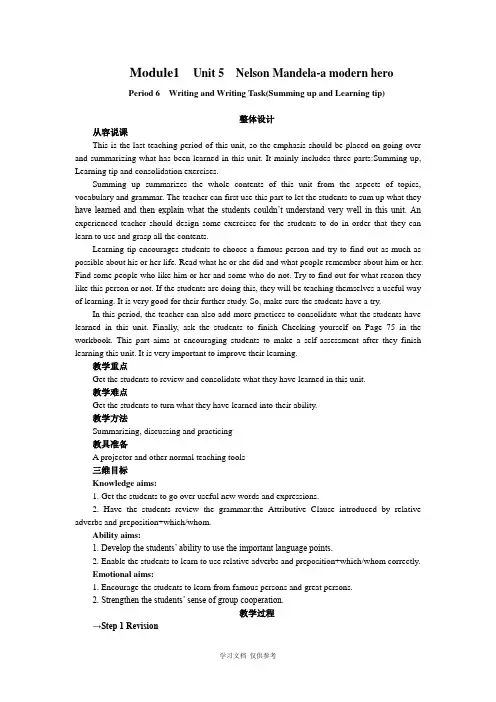
Module1 Unit 5Nelson Mandela-a modern heroPeriod 6Writing and Writing Task(Summing up and Learning tip)整体设计从容说课This is the last teaching period of this unit, so the emphasis should be placed on going over and summarizing what has been learned in this unit. It mainly includes three parts:Summing up, Learning tip and consolidation exercises.Summing up summarizes the whole contents of this unit from the aspects of topics, vocabulary and grammar. The teacher can first use this part to let the students to sum up what they have learned and then explain what the students couldn’t understand very well in this unit. An experienced teacher should design some exercises for the students to do in order that they can learn to use and grasp all the contents.Learning tip encourages students to choose a famous person and try to find out as much as possible about his or her life. Read what he or she did and what people remember about him or her. Find some people who like him or her and some who do not. Try to find out for what reason they like this person or not. If the students are doing this, they will be teaching themselves a useful way of learning. It is very good for their further study. So, make sure the students have a try.In this period, the teacher can also add more practices to consolidate what the students have learned in this unit. Finally, ask the students to finish Checking yourself on Page 75 in the workbook. This part aims at encouraging students to make a self-assessment after they finish learning this unit. It is very important to improve their learning.教学重点Get the students to review and consolidate what they have learned in this unit.教学难点Get the students to turn what they have learned into their ability.教学方法Summarizing, discussing and practicing教具准备A projector and other normal teaching tools三维目标Knowledge aims:1. Get the students to go over useful new words and expressions.2. Have the students review the grammar:the Attributive Clause introduced by relative adverbs and preposition+which/whom.Ability aims:1. Develop the students’ ability to use the important language points.2. Enable the students to learn to use relative adverbs and preposition+which/whom correctly.Emotional aims:1. Encourage the students to learn from famous persons and great persons.2. Strengthen the students’ sense of group cooperation.教学过程→Step 1 Revision1. Check the homework exercises.2. Dictate some useful new words and expressions in this unit.→Step 2 Lead-inTell the students: Up to now, we have finished Unit 5. Have you learned and grasped all in this unit? Turn to Page 40. You can check yourself by filling in the blanks in the part Summing Up.→Step 3 Summing UpFive minutes for the students to sum up by themselves. Then check and explain something where necessary.Suggested answers:Write down what you have learned about Nelson Mandela.We have learned many noble qualities about Nelson Mandela, such as intelligent, determined, generous, kind, unselfish, hard-working, brave, confident, and so on.From this unit you have also learneduseful verbs:fight, advise, continue, vote, accept, fear, reward, sentenceuseful nouns:hero, quality, republic, principle, fight, prison, prisoner, period, law, fee, gold, youth, league, stage, vote, position, violence, blanket, degree, guard, terror, fear, cruelty, reward, right, criminal, leader, presidentuseful adjectives:willing, active, peaceful, gold, equal, educated, anti-blackuseful expressions:lose heart, in trouble, worry about, out of work, Youth League, as a matter of fact, blow up, put. . . in prison, come to power, set up, be sentenced tonew grammar item:the Attributive Clause introduced by relative adverbs and preposition+which/whom→Step 4 Word and expression exercisesShow the exercises on the screen or give out exercise papers.1. Fill in the blanks with the missing words according to the first letter or Chinese meaning given.1)Nelson Mandela was regarded as one of the best l of the black people.2)I think you must solve your problem in a p way. F ighting can’t solve any problem.3)The full name of our great motherland is the People’s R of China.4)I don’t think ten years is a long p of time.5)You must try to improve the q of all your products.6)Nobody forced me to do it; I was w to do it.7)At present, women hold an important______________ (地位)in our country.8)A middle-aged woman killed her husband, which showed her______________ (残忍).9)You must be______________ (积极的)in all kinds of sports to keep healthy.10)I______________ (劝说)her to give up that idea, but she didn’t listen to me.11)I like all the______________ (男主角)of this play, because they are so kind.12)Don’t you think fighting is a serious act of______________ (暴力)?13)Since he was better______________ (受过教育的), he got a job in an office.14)The actress in poor health and has to leave______________ (舞台)soon.15)I guess this film will______________ (持续)for another fifteen minutes.2. Fill in each of the blanks with the proper phrase given. Change the form where necessary.1〕The sudden heavy snow______________ them______________ getting home as early as expected.2〕His glasses fell down to the ground and____________ _______________ _______________ .3〕Don’t____________ ____________her health; I think she will take good care of herself.4〕I just can’t understand why she is___________ _____________ ___________ again.5〕You can’t___________ ___________in face of any difficulty.6〕Boys and girls, let’s do our best to help those______________ ______________ .7〕It is reported that the new president will__________ ________________ ________________ next month.8〕It is said that a new factory will be_____________ _______________ in my hometown.9〕The murderer will___________ _____________ ________________ _______________for killing a few girls.10〕The thief will____________ ______________ _______________ _____________for stealing quite a few expensive cars.First get the students to do the exercises. Then the answers are given. The teacher can give them explanations when necessary.Suggested answers:1. 1)leaders2)peaceful3)Republic4)period5)quality6)willing7)position 8)cruelty9)active10)advised11)heroes12)violence13)educated14)stage 15)continue2. 1)stopped; from2)broke into pieces3)worry about4)out of work5)lose heart 6)in trouble7)come to power8)set up9)be sentenced to death10)be put in prison→Step 5 Grammar exerc isesShow the exercises on the screen or give out exercise papers.1. Complete the following sentences with “preposition+which/whom”.1)This is the rock______________ the boy fell down into the sea.2)Yesterday we had a meeting,______________ we discussed a lot of questions.3)The film star______________ we talked a lot will give us a speech tomorrow.4)Nothing can grow on the moon______________ there is neither water nor air.5)The West Lake______________ Hangzhou is famous in the world will be more beautiful.6)The newspaper______________ he often writes articles is China Daily.7)The stories about the Long March are well written,______________ this is one example.8)The subject______________ Xiao Wang is good is physics.9)The professor______________ Mr. Smith shook hands yesterday has made new discoveries in science.10)At last I met the writer______________ I had heard long before.2. Fill in the blanks with proper relative pronouns or relative adverbs.1)The city______________ I was born has a lot of parks.2)I don’t like cities______________ have a lot of factories.3)New Year’s Eve is a time______________ I am always looking forward to.4)My birthday is a day______________ I think about my future.5)He is the cleverest boy______________ I have ever seen.6)I saw a house the windows of______________ are broken.7)I saw a house______________ windows are broken.8〕I will never forget the days______________ I worked together you on the farm.9〕He has got himself into a dangerous place______________ he is likely to lose his way.10〕We expressed the hope______________ they had expressed.First get the students to do the exercises. Then the answers are given. The teacher can give them explanations where necessary.Suggested answers:1. 1〕from which2〕at which3〕about whom4〕on which5〕for which6〕for which7〕of which8〕at which9〕with whom10)of whom2. 1)where2)which/that3)(which/that)4)when5)(that)6)which7)whose 8)when9)where10)(which/that)→Step 6 Learning tipAsk the students to turn to Page 40. Read through the passage and make sure they understand it. Encourage them to do as the passage tells to because if they are doing so they will be teaching themselves a useful way of learning.→Step 7 Assessment1. Checking yourself (on Page 75 in the Workbook)First get the students to think about these questions individually. Then they can discuss in groups sharing their experience. The teacher can join in and give them advice and suggestions where necessary.2. Testing assessmentShow the exercises on the screen or give out test papers.1)Choose the best answers.(1)Dorothy always spoke highly of her role in the play,______________, of course, made the others unhappy.A. whoB. whichC. thisD. what(2)I shall never forget the days______________ I lived in the country with my parents.A. thatB. whichC. whenD. at which(3)The factory______________ his brother works lies in the south of the city.A. thatB. whichC. on whichD. where(4)My family climbed up the hills,______________ we had a picnic.A. on the top of whichB. on its topC. on the top of thatD. on the top of it(5)We were next-door neighbors for three years, during______________ we met only twice.A. whichB. thisC. thatD. the(6)All______________ is needed is some oil.A. the thingB. thatC. whatD. which(7)I, who______________ your friend, will go all out to help you.A. isB. areC. amD. be(8)They took care of the old man______________ son lost his life in the fire.A. whoB. thatC. whichD. whose(9)The scientist,______________ my father worked, went abroad last year.A. by whomB. with whomC. whoD. whom(10)Can you tell me the name of the company______________ you visited last week?A. /B. whereC. whatD. to which2)ClozeRead the following passage, get the main idea and fill in the blanks according to the first letters given to complete the passage.Nelson Mandela, b on July 18, 1918, is the first black president of South Africa. He studied l after he entered university. In 1944 he f the ANC Youth League. Then in 1952 he set up a law o to help poor black people. Because of his fight a the government and anti-black laws, he was s to five years hard labor. Fighters from ANC began to b up buildings in 1963 and he was sentenced to life imprisonment on Robben Island. Twenty-seven years later, he was f by the white government. In 1993 he was m president of South Africa and the government by and for black people was finally set up.Nelson Mandela is a g man.First get the students to do the following exercises. Then the answers are given. The teacher can give them explanations where necessary.Suggested answers:1)(1)B(2)C(3)D(4)A(5)A (6)B(7)C(8)D(9)B(10)A2)born; law; formed; office; against; sentenced; blow; freed; made; great→Step 8 Homework1. Finish off the Workbook exercises.2. Review and summarize what you have learned in Unit 5.活动与探究Choose a famous person and go to the library or get online to try to find out as much information as you can about his or her life. Write a report on your research and share it with your classmates. You report should include the following:1. What this person did.2. What people remember about this person.3. Who like this person and who do not.4. Why they like this person or not.。
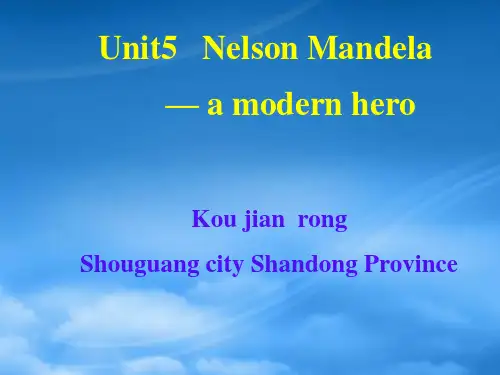
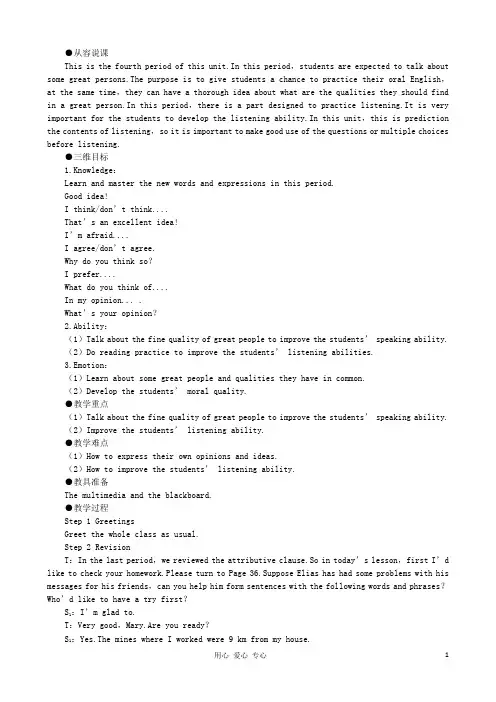
●从容说课This is the fourth period of this unit.In this period,students are expected to talk about some great persons.The purpose is to give students a chance to practice their oral English,at the same time,they can have a thorough idea about what are the qualities they should find in a great person.In this period,there is a part designed to practice listening.It is very important for the students to develop the listening ability.In this unit,this is prediction the contents of listening,so it is important to make good use of the questions or multiple choices before listening.●三维目标1.Knowledge:Learn and master the new words and expressions in this period.Good idea!I think/don’t think....That’s an excellent idea!I’m afraid....I agree/don’t agree.Why do you think so?I prefer....What do you think of....In my opinion... .What’s your opinion?2.Ability:(1)Talk about the fine quality of great people to improve the students’speaking ability.(2)Do reading practice to improve the students’ listening abilities.3.Emotion:(1)Learn about some great people and qualities they have in common.(2)Develop the students’ moral quality.●教学重点(1)Talk about the fine quality of great people to improve the students’speaking ability.(2)Improve the students’ listening ability.●教学难点(1)How to express their own opinions and ideas.(2)How to improve the students’ listening ability.●教具准备The multimedia and the blackboard.●教学过程Step 1 GreetingsGreet the whole class as usual.Step 2 RevisionT:In the last period,we reviewed the attributive clause.So in today’s lesson,first I’d like to check your homework.Please turn to Page 36.Suppose Elias has had some problems with his messages for his friends,can you help him form sentences with the following words and phrases?Who’d like to have a try first?S1:I’m glad to.T:Very good,Mary.Are you ready?S1:Yes.The mines where I worked were 9 km from my house.T:Well done.Who want a try again?S2:Let me try.The time when we arrived was late at night.(Form sentences with the list words and phrases in the same way.Encourage students to make up as many sentences as possible.)Possible sentences:1.The reason why I got a job was because of my hard work.2.The government building where we arrived was very grand.3.The date when I joined the ANC Youth League was the 5th of August.T:You’ve done a good job.But I’m sorry to tell you that Elias has lost some of his messages.Can you help him?Ss:Of course.T:You’re very kind.Please help him by completing the following sentences:1.The day when Elias first met Nelson Mandela was a very exciting time.2.South Africa is now a country where the blacks have the same rights as the whites.3.This is the government building in which Elias blew it up.4.The person to whom the blacks often turned for help is Nelson Mandela.T:Now perhaps you’re a little tired.Let’s play the game in groups of four.The first person begins with a sentence and each person in the group adds extra and different information using the attributive clause.Now please look at the example and read it together.(Show the example on the screen.)Example:S1:The school was very large.S2:The school where I learned was very large.S3:The school where I learned for six years was very large.S4:The school where I learned for six years so unhappily was very large.T:Now please change places.For example,S2 begins the game with another sentence.Do this several times until every one of you has had a go.I’ll give you several minutes to practice.(Some minutes later,check with the whole class.)T:Please stop here.It’s time to present your set of sentences to the class.Any volunteer?Ss:We want a try.T:Good.Please begin.Possible sentences:1.S1:The factory has been closed.S2:The factory where I worked has been closed.S3:The factory where I worked for two years has been closed.S4:The factory where I worked with Tom for two years has been closed.2.S5:The year was 1809.S6:The year when Lincoln was born was 1809.S7:The year when Lincoln was born in Kentucky was 1809.S8:The year when Lincoln was born in a poor family in Kentucky was 1809.Step 3 ListeningT:The game is so interesting,isn’t it?At the same time,you did very well.Now,let’s turn to the next part.In the reading passage,Elias told us his experience.So my question is:Did Elias join the ANC Youth League?Ss:Yes.T:Why do you think Elias join the ANC Youth League?S3:Because the ANC Youth League was organized by Nelson Mandela,who had helped Elias when Elias was in great trouble.So Elias never forgot how kind Nelson Mandela was and joined the ANC Youth League as soon as possible.T:Good.Do you think it is right to join the ANC Youth League?Please give your reason.S4:I think it is right.Because at that time,black people were treated unfairly.Take Elias for example,he had to leave school because his family could not continue to pay the school fees and the bus fare,so he could not read or write.When he got a job in a gold mine,he was worried about whether he would be out of work simply because he did not have the passbook because he was not born there.There were the greatest number of laws stopping their rights and they had almost no rights at all.So when Nelson Mandela organized the ANC Youth League to struggle against racial discrimination in South Africa,it is natural for Elias to join it as soon as he could and it is to realize their dream of making black and white people equal.T:Very good.So if you were Elias,you would do the same thing as him,right?S4:Right.T:Do you agree with him/her?Ss:Yes.T:Of course,I would,too.From the reading passage,we know a lot of information of racial discrimination in South Africa.Just now,we talked a lot about why Elias joined the ANC Youth League according to the reading passage.Today we’ll listen to the tape and then please find out the true reason why Elias joined the ANC Youth League.T:Now please open your books at Page 37.Before you listen to the tape,please read the multiple choices fast to find out the listening points first.While you read,you’d better make notes of the listening points.Now,I’ll play the tape twice.Please listen carefully and pay more attention to the important points.You may make notes for you to remember the important points.Are you ready?Ss:Yes.T:OK.Let’s begin.Step 4 ListeningT:Just now we listened a passage about Elias.Now we’ve going to listen to a passage about William Tyndale.Who is William Tyndale?Ss:William Tyndale wrote the Bible in English so all could read it.He died for his ideas,but his work was later used in the Bible.T:Yes,we talked about him in the first period.After we listen to the passage,we’ll know more information about him.Please look at the questions before we listen to the text,which will help you understand the listening points.(Give the students two minutes to read the questions.)T:Now I’ll play the tape twice.Please listen carefully and pay more attention to the important points.Please make notes if necessary.Step 5 TalkingT:It’s time for you to do some oral practice.Let’s talk about your hero/heroine.Please use the following questions to help you.Who is your hero/heroine?Why do you like her/him so much?Did he/she do anything for others?What are his/her best qualities?By the way maybe the following sentence patterns are helpful for you.Good idea!I think/don’t think....That’s an excellent idea!I’m afraid....I agree/don’t agree.Why do you think so?I prefer....What do you think of...?In my opinion....What’s your opinion?(Give students five minutes to have a discussion.)T:OK.Time is up.Is everybody ready?Who’d like to try to tell us his/her opinion?S5:I think Marie Curie is my heroine.My favorite scientist is Madam Curie.Why was Marie Curie a significant woman in European Science?Because she was the first woman to be awarded a doctorate,the first woman to become a professor at the University of Paris,the first woman to win a Nobel Prize and the first person of either sex to win two Nobel Prizes.Marie Curie was the most successful scientist to come out of Poland.She saw science as a beauty that she wanted to withhold.Science to her was an unknown fairy tale phenomenon that she was determined to discover.Marie Curie wanted to use science to help others and the world.She accomplished this by working in World War Ⅰ,and discovering radium,and polonium.Marie Curie’s discovery of polonium was a great scientific finding.This is because it helped the research of uranic rays,and it led to the discovery of radium.The work of Marie Curie was not just important for her discoveries of new elements,but the process she used to isolate them,helped to create a “stockpile” of a few grams of radioactive material,which future scientists could use for further studies.As a result of her work X-Rays are very common today,as is Carbon dating,radiotherapy,and other medical applications for radiation.It is for no small reason that Marie Curie is considered by most to be the greatest woman scientist of all time.The world indeed owes a great debt to Marie Curie.S6:I agree with you,but I think Albert Einstein is my hero.Albert Einstein was born on March 14,1879 in Ulm,Wurttemberg,Germany.Einstein contributed more than any other scientist since Sir Isaac Newton to our understanding of physical reality.Einstein worked at the patent office in Bern,Switzerland from 1902 to 1909.During this period he completed an astonishing range of theoretical physics publications,written in his spare time,without the benefit of close contact with scientific literature or colleagues.The most well known of these works is Einstein’s 1905 paper proposing “the special theory of relativity”. Later in 1905 Einstein showed how mass and energy were equivalent expressing it in the famous equation:E=mc2(energy equals mass times the velocity of light squared).This equation became a cornerstone in the development of nuclear energy.Einstein received the Nobel Prize in 1921 but not for relativity,rather for his 1905 work on the photoelectric effect.He worked on at Princeton until the end of his life on an attempt to unify the laws of physics.Step 6 SummaryT:I agree with you,too.Well done.Thank you for your wonderful performance.Now,let’s see what we’ve done in this period.First,we’ve checked your homework about the attributive clause.Second,we practise listening.Third,we’ve talked about your hero/heroine.Of course,we’ve learned some useful expressions.After class,practise them more and preview the next part —reading.That’s all for today.See you.Step 7 HomeworkPreview the reading passage.●板书设计Unit 5 Nelson Mandela—a modern heroThe Fourth PeriodGood idea!I think/don’t think....That’s an excellent idea!I’m afraid....I agree/don’t agree.Why do you think so?I prefer....What do you think of...?In my opinion....What’s your opinion?●活动与探究Think about how often you do the following and write in the number that you think matches that frequency?On a scale from 1 to 5,give yourself a score as follows:1=never,2=rarely,behavior scoreI avoid staying on any subject with my partner.I make assumptions about my partners feelings or thoughts.I respond to my partner’s suggestions or opinions with,“Yes,but...”I bring up past issues during current disagreements.I interrupt my partner’s conversation.I use sarcasm or jokes to respond when my partner talks.I respond to a complaint with a complaint.I insult and criticize my partner.I respond to my partner with phrases like,“That’sridiculous.”I see only my point of view.TOTAL (Add up your scores.)●备课资料Qian XuesenChina has launched its first manned spacecraft,the Shenzhou V,Oct.15,becoming the third country to put a man into space,following the former Soviet Union and the United States.Today,we’ll bring you the story of Qian Xuesen (Chien Hsuch-Sen),“father of China’s aerospace”and“king of rockets”.Qian is one of the pioneers of China’s space science.A world-famous expert on aerospace rockets and aerodynamics.Qian has obtained great attainments in the areas of applied mechanics,engineering cybernetics and system engineering and made distinguished contributions to the foundation and development of Chinese aerospace undertaking.He plays a leading role in the research,manufacture and testing of carrier rockets,guided missiles and satellites.Due to research and development led by Qian,China successfully exploded its first atom bomb in 1964,launched its first man-made satellite in 1970,fired its first transcontinental ballistic missile toward the Pacific in 1980,and launched its first manned spacecraft on Oct.15,2003.With his ancestral home in Hangzhou,Jiangsu Province,Qian was born in Shanghai in 1911.Qian graduated from Shanghai Jiao Tong University in 1934.One year later,he went to the U.S.and continue his studies in MIT (Massachusetts Institute of Technology),after receiving master’s degree in MIT,Qian went to study in California Institute of Technology.In 1939,Qian received Ph.D degrees of both aerospace and mathematics and left the school to be a teacher,as well as a researcher studying the applied mechanics and rocket and missile theories.In 1955,six years later after the founding of New China,Qian Xuesen returned to the motherland.He has served successively as director-general with the mechanics institute of Chinese Academy of Sciences,deputy director-general and director-general with the fifth research institute of the State Defense Ministry,deputy minister with State Ministry of The Seventh Machinery,deputy-director-general with the Commission of Science,Technology and Industry for National Defense,president with the 3rd China Association for Science and Technology,vice president with the 6th to the 10th Chinese People’s Political Consultative Conference (CPPCC).Currently,Qian is the senior consultant with the Commission of Science and Technology of the General Equipment Ministry of the People’s Liberation Army,honorary president with China Association for Science and Technology.In 1956,Qian put forward “Proposal on the Development of China’s Aviation Industry for National Defense” and assisted Zhou Enlai,the then premiere,and Marshal Nie Rongzheng to prepare the establishment of China’s first missile and rocket R&D structure,the Fifth Research Institute of State Ministry of Defense.In the October of 1956,Qian assumed office of director-general with the fifth research institute.Henceforth,Qian has long been in charge of the chief technological officer with the R&D of China’s missile,rocket and spacecraft,and has contributed great to the establishment and development of China’s missile,rocket and spacecraft undertakings.。
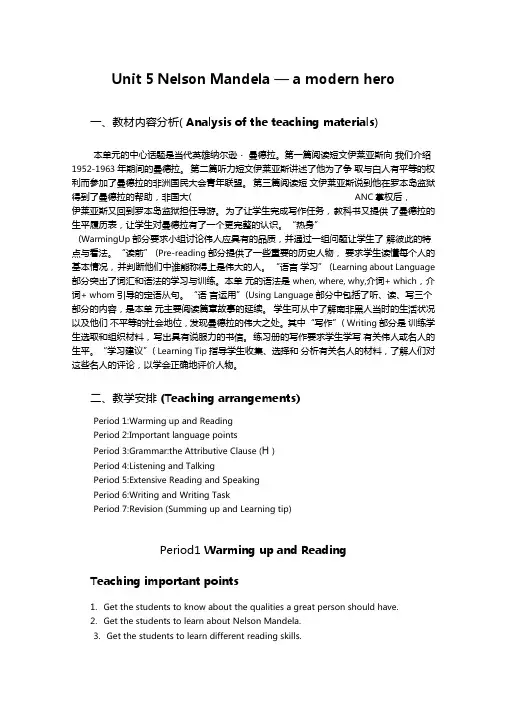
Unit 5 Nelson Mandela —a modern hero一、教材内容分析( Analysis of the teaching materials)本单元的中心话题是当代英雄纳尔逊・曼德拉。
第一篇阅读短文伊莱亚斯向我们介绍1952-1963 年期间的曼德拉。
第二篇听力短文伊莱亚斯讲述了他为了争取与白人有平等的权利而参加了曼德拉的非洲国民大会青年联盟。
第三篇阅读短文伊莱亚斯说到他在罗本岛监狱得到了曼德拉的帮助,非国大( ANC掌权后,伊莱亚斯又回到罗本岛监狱担任导游。
为了让学生完成写作任务,教科书又提供了曼德拉的生平履历表,让学生对曼德拉有了一个更完整的认识。
“热身”(WarmingUp部分要求小组讨论伟人应具有的品质,并通过一组问题让学生了解彼此的特点与看法。
“读前” (Pre-reading部分提供了一些重要的历史人物,要求学生读懂每个人的基本情况,并判断他们中谁能称得上是伟大的人。
“语言学习” (Learning about Language 部分突出了词汇和语法的学习与训练。
本单元的语法是when, where, why,介词+ which,介词+ whom引导的定语从句。
“语言运用”(Using Language部分中包括了听、读、写三个部分的内容,是本单元主要阅读篇章故事的延续。
学生可从中了解南非黑人当时的生活状况以及他们不平等的社会地位,发现曼德拉的伟大之处。
其中“写作”( Writing 部分是训练学生选取和组织材料,写出具有说服力的书信。
练习册的写作要求学生学写有关伟人或名人的生平。
“学习建议”( Learning Tip 指导学生收集、选择和分析有关名人的材料,了解人们对这些名人的评论,以学会正确地评价人物。
二、教学安排(Teaching arrangements)Period 1:Warming up and ReadingPeriod 2:Important language pointsPeriod 3:Grammar:the Attributive Clause (H )Period 4:Listening and TalkingPeriod 5:Extensive Reading and SpeakingPeriod 6:Writing and Writing TaskPeriod 7:Revision (Summing up and Learning tip)Period1 Warming up and ReadingTeaching important points1.Get the students to know about the qualities a great person should have.2.Get the students to learn about Nelson Mandela.3.Get the students to learn different reading skills.Teaching difficult points1.Develop the students ' reading ability.2.Enable the students to learn how to give their opinions.Teaching methods1.Task-based teaching and learning2.Cooperative learningTeaching steps—Step 1 Warming upDiscuss some questions to lead in the topic: the qualities a great person should have.1. When talking about a person, what adjectives can you think of to describe his or her qualities?2. What kind of a person are you? Do you think you have the qualities to be a great person?3.What are the qualities you should find in a great person?—Step 2 Pre-reading1. Looking and answeringLook at the six people in the part Pre-reading and answer some questions.1)Can you recognize them? Who are they?2)Do you think they are important people? Why or why not?3)Do you think all of them are great people?2. Discussing and speakingDiscuss in pairs what qualities make a great person and find out whether each of the six persons is a great person or not.—Step 3 While-reading1. Lead-in and guessingTell the students:We are going to read about Nelson Mandela. Look at the title of the text. Can you guess what kind of writing the text is?2. Skimming for topic sentences and general idea3.Scanning for detail informationDo Exercise 1 and Exercise 2 in the part Comprehending.4.Further understanding1)What disadvantages did Elias have in finding a job?2)How did the white people stop the black people from being treated fairly?3)How did the new government in South Africa treat the white people?4)Why did Elias support Mandela?5)Why did he support violence when he did not agree with it?nguage problemsWhile checking the answers with the whole class, deal with any language problems.6.Reading aloud to the recording—Step 4 Afte-reading1. Discussing and answering1)Do you think it is fair to treat others badly for things they cannot change, like the colors of skin or eyes or the race one belongs to? Give a reason.2)What do you learn about Nelson Mandeal from Elias ' Story?3)Do you like the way Elias tells his story? Give a reason.2. Playing an interview gameWork in pairs. Suppose one is a journalist, and the other is Elias. A journalist is interviewing Elias.—Step 5 ConsolidationAsk the students to retell Elias 'Story according to the following clues:Elias problem; Mandela 's help; Elias ' support.—Step 6 Homework1. Finish off the related exercises in the textbook.2. Read the text Elias ' Story again and try to retell it.。
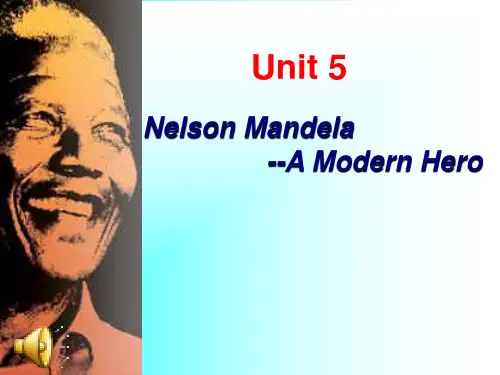
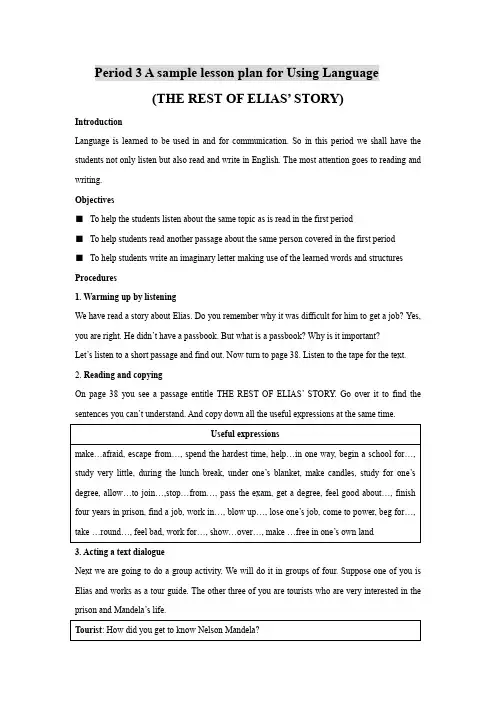
Period 3 A sample lesson plan for Using Language(THE REST OF ELIAS’ STORY)IntroductionLanguage is learned to be used in and for communication. So in this period we shall have the students not only listen but also read and write in English. The most attention goes to reading and writing.Objectives■To help the students listen about the same topic as is read in the first period■To help students read another passage about the same person covered in the first period■To help students write an imaginary letter making use of the learned words and structures Procedures1. Warming up by listeningWe have read a story about Elias. Do you remember why it was difficult for him to get a job? Yes, you are right. He didn’t have a passbook. But what is a passbook? Why i s it important?Let’s listen to a short passage and find out. Now turn to page 38. Listen to the tape for the text.2. Reading and copyingOn page 38 you see a passage entitle THE REST OF ELIAS’ STORY. Go over it to find the sentences you can’t understan d. And copy down all the useful expressions at the same time.3. Acting a text dialogueNext we are going to do a group activity. We will do it in groups of four. Suppose one of you is Elias and works as a tour guide. The other three of you are tourists who are very interested in the prison and Mandela’s life.4. Doing a guided writing task⑴Preparing for writingImagine now Mr Mandela is in prison. If you are going to write a letter to the President of South Africa asking him to free Nelson Mandela, what would be included? Do you remember the format of a letter? What should be the main content of this letter? How would you try to persuade the president?Now go over Life of Nelson Mandela on page 39 for any useful information.⑵Writing the letter5. Closing down by sharingTo end this period share your letter with your partners and make necessary changes.。
Unit 5 Nelson Mandela第五课时ListeningUsing language第一步:学生阅读练习的问题(教师可作简单的提示),如 ANC Youth League第二步:听录音,完成选择题;第三步:全班对答案或同桌之间讨论答案;第四步:精听录音,可重复学生认为难的部分;第五步:小组讨论:1. What disadvantages did Elias havding a job?2. Is it faabadlgannot change, like sexlouace one belongs to?3. Aany people in Guangdong Province that aated fairly? Why do youare looked down upon? As a high school student, what can you do to changuation? 第六步:个别同学与大家分享他们的想法。
Listening task第一步:老师手持一手提袋(或身边任意物品)问学生:What do youandbag? Do youbeautiful?第二步:教师提示:对相同的事物不同人有不同看法(Dle may have dviewaybe that is wlice question dle to get accurate evidence);第三步:学生先浏览要求课本题目,然后播放录音,并提醒学生做笔记;第四步:学生先讨论问题答案,然后师生一起讨论,教师不公布正确答案;第五步:再次播放录音。
师生共同讨论正确答案;第六步:如学生对答案有异议,可再次播放录音。
Homework:Summing Up on page 40。
Unit5 Nelson Mandela--- a modern heroWarming up and speaking Teaching aims(教学目标)1.Knowledge:(语言知识目标)(1)students learn and master the words:(hard-working lazy friendly cruel warm-hearted mean determined wise active generous easy-going reliable unkind brave selfish stubborn selfless devoted handsome nice honest famous calm lovely)(2) Students can use the Attributive clause to describe how to can be a great person.(3 )Students can make a dialogue to talk about their hero/ heroine in group work by using the following expressionsWhat’s your opinion?What are your ideas?Do you have any ideas on that? What do you think of…..? How do you feel about that? Why do you think so?I think / don’t think…I believe\I don’t believe (that)…In my opinion…..To my understanding…?I’m with you.I feel that …\I don’t feel that …..2.Ability:(能力目标)(1)Talk about the fine quality of great people to improve the students’ speaking ability.(3)Learn to think about a person or a situation in different respects.3.Emotion:(情感目标)(1)Learn about some great people and qualities they have in common.(2)Develop the students’ moral quality.Important teaching points(教学重点)Students have a discussion about the fine quality of great people to improve the students’ speaking ability and learn to use give opinions by making a dialogue. Difficult teaching points(教学难点)Students how to express their own opinions and ideas in English in class. Teaching methods(教学方法)Ask and answer questions Group work to discuss Act out in class Teaching procedures(教学过程)Step 1. Lead- in(Before class, get the Ss to enjoy a beautiful song Hero for 2-3 minutes. After enjoying, ask the Ss some questions in a moving atmosphere.)T: Well, for a beautiful song, do you know what it is about?S :HeroQ: Who is your hero/heroine?/ Who do you admire in your heart?Ss: …Q: Why?S: …Qs: Do you think he/she is a famous man? Does he/she a great person?S: …Step2:Warming up(Show pictures in talking part one by one)Qs: How about this person? Do you admire him/? Is he another hero in your heart? What do you know about him? Do they great people? Does famous person mean great person? What qualities does a great person have?(Give background knowledge and then ask students to discuss and conclude what adjectives can describe a great person and how to use the attributive clause to express how to a great person.)Conclusion: Let Ss say: I think a great person is someone who is +adj._____________ In my opinion, a great person is someone who never+v.St ep3 SpeakingFirstly,students learn the expressions on how to give opinions.Secondly, students work in group to make a dialogue to talk about their hero.(Give some pictures of people and background knowledge to students)For example:A: Who is your hero?B: Nelson Mandela is my hero. He was born in South Africa.A: What do you think of him ?B: In my opinion, he helped the black people in South Africa to get equality. He is unselfishA: Does he a great person?B:Yes I think so. He sets a good example to us. We can learn from him.B: What about you ? Who is your hero?A:…………Thirdly, ask students in team work to write down the dialogue in a piece of papers . After 5minutes , ask them to act out it in class.Step4 SummeriseUse1/ 2 minutes what students have learned in this class.Step5 Homework1.Memorize new words and phrases.2.Surf the internet or read books to find some information about Nelson Mandela.3. Preview Elia’s Story.。
Unit5 Nelson Mandela-------a modern hero
Listening_Speaking and Writing
一、教学目标Teaching aims
Improve the students’ listening ability
1.教学内容Teaching contents
P37, P69, P72 Listening task.
2.能力目标Ability aims
Tell the Ss’how to get the information about listening in advance.
According to the contents of listening, let the students get the skills of listening.
3.语言目标Language aims
a. 词组和短语
Elias, ANC, Youth league, underground, Bible.
b. 重点句子
What does a “point of view” mean?
Why did the two speakers have different ideas about the cause of the accident?
二、教学重难点Teaching important points
Listen to the three materials about Elias, Bible and Accidents and choose the correct answers. Work together with partners and write down their reasons of accidents.
三、教学方法Teaching methods
Listening and cooperative learning
四、教具准备Teaching aids
A recorder, tapes & a projects
五、教学步骤Teaching procedures
Step I: Revision
Get the Ss’ to retell Elias’ story with their own words
Step II: Listening (P37)
Ss’ are asked to read the questions and multiple answers to find out the listening points first, then listen to the tape three times to choose the best answers and answer the two questions.
T: Please open your books and turn to Pages. Before you listen to the tape, please read first the questions and multiple answers to find out your listening points. Pay attention to these important points while listening. Now, I’ll play the tape twice. Please listen carefully and pay much attention to the important points. You may choose the best answers while listening the second time.
Check the answers together.
T: Listen to the tape a third time and the following two questions:
1.Do you think Elias was right to join the ANC Youth League? Give your reason
2.Imagine you are Elias, what would you do? Give your reason.
Ask some Ss to answer them..
Step III: Listening
T: Let’s come to Page69, look at the questions before you listen to the text, and answer them..
Play the tape three times.
Step IV : Listening Task
Listen and answer the questions in Part1.
T: Now turn to Page72. .In the listening task, there are four questions. You should form the habit of going through the questions to get the important listening points. And make notes if necessary.
After listening, check the Ss’ work. The teacher gives the answers.
T: Now look at the two tables in Part2. I’ll play the tape a third time
.After listening, the Ss check their answers with their partners.
Step V: Homework:
Write down the cause of the accident.
Preview Writing。